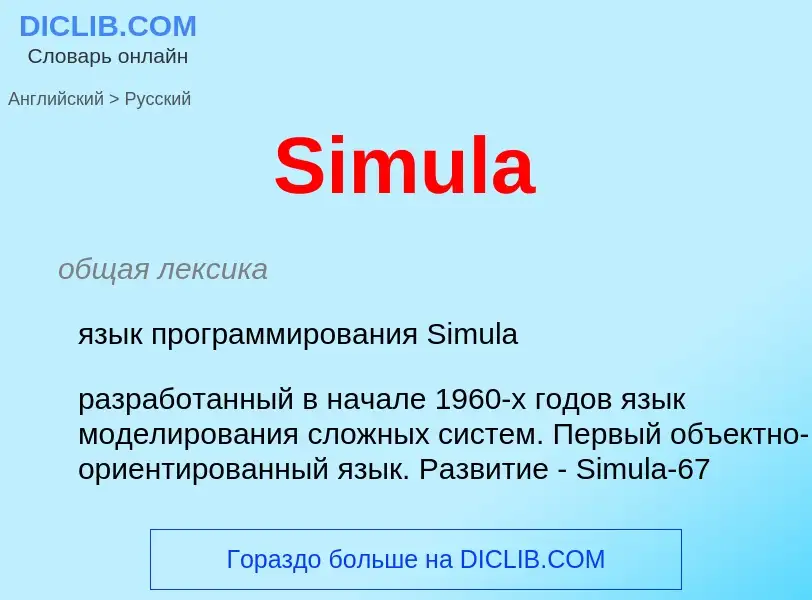Übersetzung und Analyse von Wörtern durch künstliche Intelligenz ChatGPT
Auf dieser Seite erhalten Sie eine detaillierte Analyse eines Wortes oder einer Phrase mithilfe der besten heute verfügbaren Technologie der künstlichen Intelligenz:
- wie das Wort verwendet wird
- Häufigkeit der Nutzung
- es wird häufiger in mündlicher oder schriftlicher Rede verwendet
- Wortübersetzungsoptionen
- Anwendungsbeispiele (mehrere Phrasen mit Übersetzung)
- Etymologie
Simula - Übersetzung nach Englisch
общая лексика
язык программирования Simula
разработанный в начале 1960-х годов язык моделирования сложных систем. Первый объектно-ориентированный язык. Развитие - Simula-67
Смотрите также
общая лексика
[язык] Смолток
его разработали в 1972 г. Алан Кей (Alan Kay) и сотрудники исследовательской группы Software Concept Group фирмы Xerox PARK (США). Первый объектно-ориентированный язык сверхвысокого уровня. Характеризуется интерактивным графическим взаимодействием с пользователем. В нём использованы концепции классов и сообщений из языка Simula-67. В своем развитии язык прошел следующие версии: Smalltalk-72, Smalltalk-74, Smalltalk-76, Smalltalk-78, Smalltalk-80, GNU Smalltalk, Smalltalk/V
дословная передача
"короткий разговор"
Смотрите также
Definition
Wikipedia
Simula is the name of two simulation programming languages, Simula I and Simula 67, developed in the 1960s at the Norwegian Computing Center in Oslo, by Ole-Johan Dahl and Kristen Nygaard. Syntactically, it is an approximate superset of ALGOL 60,: 1.3.1 and was also influenced by the design of Simscript.
Simula 67 introduced objects,: 2, 5.3 classes,: 1.3.3, 2 inheritance and subclasses,: 2.2.1 virtual procedures,: 2.2.3 coroutines,: 9.2 and discrete event simulation,: 14.2 and featured garbage collection.: 9.1 Other forms of subtyping (besides inheriting subclasses) were introduced in Simula derivatives.
Simula is considered the first object-oriented programming language. As its name suggests, the first Simula version by 1962 was designed for doing simulations; Simula 67 though was designed to be a general-purpose programming language and provided the framework for many of the features of object-oriented languages today.
Simula has been used in a wide range of applications such as simulating very-large-scale integration (VLSI) designs, process modeling, communication protocols, algorithms, and other applications such as typesetting, computer graphics, and education. The influence of Simula is often understated, and Simula-type objects are reimplemented in C++, Object Pascal, Java, C#, and many other languages. Computer scientists such as Bjarne Stroustrup, creator of C++, and James Gosling, creator of Java, have acknowledged Simula as a major influence.


